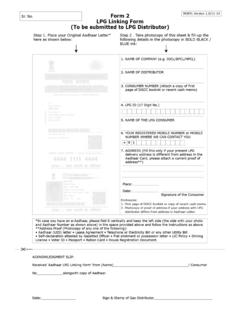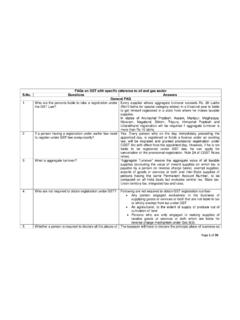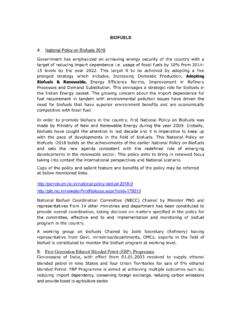Transcription of THE PETROLEUM RULES, 1976 : PRELIMINARY Part1: …
1 THE PETROLEUM rules , 1976 : PRELIMINARY . part1 : short TITLE AND DEFINITIONS. 1. short title and commencement- 1. The rules may be called the PETROLEUM rules , 1976. 2. They shall come into force on the 1st day of August, 1976. 2. Definitions- In these rules , unless the context otherwise requires- 1. "Act" means the PETROLEUM Act, 1934 (30 of 1934);. 2. "Adequate"- (a) in relation to ventilation, means where the concentration of the inflammable gas in gas-air mixture does not reach the lower inflammable limit, or (b) where applied to provision of facilities for fire-fighting means the facilities so provided are in accordance with the prevalent recognized standards or codes safety;. 3. "Approved"- (a) where applied to specification, means that the specification is authorized by the Chief Controller;. (b) where applied to an appliance or fitting, means that the appliance or fitting bears a label of a designated test organization certifying conformity with a specification approved by the Chief Controller or with a laboratory test report accepted by the Chief Controller, or (c) where applied to any facility for PETROLEUM means that it conforms to these rules .
2 4. "Chief Controller" means the Chief Controller of Explosives;. 5. "Competent person" means a person recognized by the Chief Controller to be a competent person, or a person who holds a certificate of competency for the job in respect of which competency is required from an institution recognized by the Chief Controller in this behalf;. 6. Conservator includes any person acting under the authority of the officer or body of person appointed to be Conservator of a port under of the Indian Ports Act, 1908(15 of 1908);. 7. "Container" means a receptacle for PETROLEUM not exceeding 1,000 litres in capacity. 8. Chief Controller of Explosives, Deputy Chief Controller of Explosives includes Joint Controller of Explosives and Deputy Controller of Explosives. (8-a) "Defence Forces of the Union includes General Reserve Engineering Forces under the Director General, Border Road, the Central Reserve Police Force, Assam Rifles, Border Security Force and National Security Guard under the Ministry of Home Affairs and Special Security Bureau under the Cabinet Secretariat.
3 "]. 9. "District Authority means- (a) in towns having a Commissioner of Police, the Commis- sioner or a Deputy Commissioner of Police;. (b) in any other place, the District Magistrate;. 10. "District Magistrate" includes an Additional District Magistrate and in States of Punjab and Haryana and in the Karaikal, Mahe and Yenam areas of the Union Territory of Pondicherry, also includes a Sub-divisional Magistrate;. 11. "Electric apparatus" includes motors, starters, lamps, switches, junc tion boxes, fuses, cut-outs or any other appliance, equipment or fitting which operates electricity;. 12. "Form" means form given in the First Schedule;. (12-a) "hot work" means any work which involves welding, burning, soldering, brazing and blasting, chipping by spark-producing tools, use of certain power-driven tools, non-flame proof electrical equipinent or equipment with internal combustion engines and including any other work which is likely to produce sufficient heat, capable of igniting inflammable gases.
4 13. "Inspector" means an officer authorized by the Central Government under sub-section (1) of Sec. 13 of the Act;. 14. "Installation" means any premises wherein any place has been specially prepared for the storage of PETROLEUM in bulk, but does not include a well-head tank or a service station;. 15. " PETROLEUM in bulk" means PETROLEUM contained in a tank irrespective of the quantity of PETROLEUM contained therein;. 16. "protected area" means the necessary for the maintenance of the distances required under the conditions of the licence to be kept clear between any installation, service station or storage shed and any protected works;. 17. "Protected works" include- (a) building in which persons dwell or assemble, docks, wharves, timber and coal yards, furnace, kiln or chimney and buildings or place used for storing PETROLEUM or fof any other purpose but does not include buildings or places forming part of an installation.
5 (b) any public road or a railway line which is used exclusively as an oil siding; and (c) overhead high-tension power lines;. 18. "Sampling officer" means an officer authorized by the Central Government under sub-section (1). of Sec. 14 of the Act;. 19. "Schedule" means a Schedule annexed to these rules ;. 20. "Service station" means any premises specially prepared for the fuelling of motor vehicles and includes such places within the premises which have been specially approved by the licensing authority for the servicing of motor vehicles and for other purposes;. 21. "Store shed" means a building used for the storage of PETROLEUM otherwise than in bulk, whether forming part of an installation or not, but does not include a building used for the stores of PETROLEUM exempt from licence under Secs. 7, 8 or 9 of the Act;. 22. "Tank" means a receptacle for PETROLEUM exceeding 1000 litres in capacity, 23.
6 "Tank cart" means a hand-drawn or animal-drawn vehicle equipped with a tank;. 24. "Tank semi-trailer" means a tank trailer constructed in such a manner that when it is drawn by a tractor by means of fifth wheel connection, some part of the load rests on the towing vehicle;. 25. "Tank trailer" means a tank mounted thereon or built as integral part thereof and constructed in such a manner that it has at least two axles and all its load rests on its own wheels;. 26. "Tank truck" means a single self-propelled vehicle with a tank mounted thereon;. 27. "Tank vehicle" means any vehicle, including a tank wagon with a tank of a capacity exceeding 1,000 litres mounted thereon;. 28. "Tank wagon" means a railway carriage with a tank mounted thereon. 29. "Testing officer" means an officer authorised by the Central Government to test PETROLEUM under of the Act;. 30. "Vehicles means all carriages, including animal-drawn carriages for the transportation of PETROLEUM either in bulk or otherwise than in bulk.
7 31. "Well-head tank" means a tank into which crude PETROLEUM flowing or being pumped from an oil well is first discharged. Part II : GENERAL PROVISION. 3. Restriction on delivery and despatch of PETROLEUM - 1. No person shall deliver or despatch any PETROLEUM to anyone in India other than the holder of a storage licence issued under these rules or his authorized agent or a port authority or railway administration or a person who is authorized under the Act to store PETROLEUM without a licence. 2. The PETROLEUM delivered or despatched under sub-rule (1) shall be of the class, and shall not exceed the quantity, which the person to whom it is delivered or despatched is authorized to store with or without a licence under the Act. 3. Notwithstanding anything contained in sub-rule (2), PETROLEUM Class B not exceeding 15,000. litres in quantity packed in sealed air tight approved containers may be despatched to a person not holding a storage licence provided that the person despatching the PETROLEUM has satisfied himself that prior arrangement have been made by the person to whom the PETROLEUM is despatched for the immediate disposal in the original sealed packages or such quantity as in excess of 2,500 litres.
8 4. Nothing in sub- rules (1) and (2) shall apply to the delivery of despatch of PETROLEUM to the Defence Forces of the Union 1[and to the delivery or despatch of kerosene ( PETROLEUM Class B). to the person holding licence in Form XVI for decantation into containers from tank vehicle: Provided that the person despatching the kerosene has satisfied himself that prior arrangements have been made by the person to whom the kerosene is despatched for immediate disposal into containers in lots of 2,500 litres or less. 4. Approval of containers- 1. Containers exceeding one litre in capacity for PETROLEUM Class A and five litres in capacity for PETROLEUM Class B or PETROLEUM Class C. shall be of a type approved by the Chief Controller. 2. Where the approval of the Chief Controller is sought to a type or con- tainer not previously approved, an application accompanied by twelve copies of a drawing thereof to scale showing the design, materials to be used, the method of construction and capacity of the container together with two sample containers and a fee of rupees fifty for scrutiny shall be submitted to the Chief Controller.]
9 3. Nothing in sub- rules (1) and (2) shall apply to containers in the possession of the Defences Forces of the Union. 5. Containers for PETROLEUM Class A- 1. Containers for PETROLEUM Class A shall be constructed of tinned, galvanised or externally rust- proofed sheet iron or steel and be of a type approved by the Chief Controller. 2. The containers shall be so constructed and secured as not to be liable except under circumstances of gross negligence or extraordinary accident to become defective, leaky or insecure in transit and they shall be kept in proper repair. 3. The containers shall have well-made filling aperture which shall be fitted with well fitting and secure air tight screw plugs of screw caps or other caps. 4. Containers made of sheet iron or steel shall have the following thickness of metal : 5. The capacity of any container, other than those approved by the Chief Controller for specified purposes, shall not exceed 300 litres.
10 6. An air space of not less than 5 per cent. of its capacity shall be kept in each container. 7. The container shall bear a stamped, embossed or painted warning exhibiting in conspicuous characters the words "Petrol" or "Motor Spirit" or an equivalent warning of the highly inflamable nature of the PETROLEUM . 8. Nothing in sub- rules (1), (3), (4), (5), (6) and (7) shall apply to containers in the possession of the Defences Forces of the Union. 6. Containers for PETROLEUM Class B and Class C- 1. Containers for PETROLEUM Class B or PETROLEUM Class C shall be constructed of steel or iron and be of a type approved by the Chief Controller. 2. An air space of not less than 5 per cent. of its capacity shall be kept in each container for PETROLEUM Class B and not less than 3 per cent. of its capacity in each container for PETROLEUM Class C. 3. Nothing in this rule shall apply to containers in the possession of the Defence Forces of the Union.








